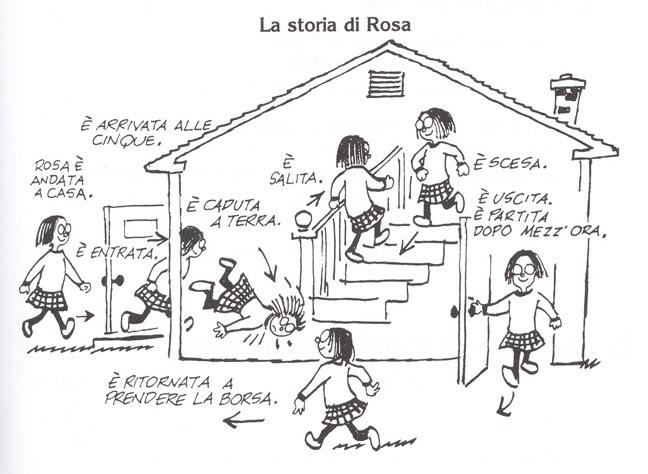6.1: Il passato prossimo
- Page ID
- 120379
\( \newcommand{\vecs}[1]{\overset { \scriptstyle \rightharpoonup} {\mathbf{#1}} } \)
\( \newcommand{\vecd}[1]{\overset{-\!-\!\rightharpoonup}{\vphantom{a}\smash {#1}}} \)
\( \newcommand{\dsum}{\displaystyle\sum\limits} \)
\( \newcommand{\dint}{\displaystyle\int\limits} \)
\( \newcommand{\dlim}{\displaystyle\lim\limits} \)
\( \newcommand{\id}{\mathrm{id}}\) \( \newcommand{\Span}{\mathrm{span}}\)
( \newcommand{\kernel}{\mathrm{null}\,}\) \( \newcommand{\range}{\mathrm{range}\,}\)
\( \newcommand{\RealPart}{\mathrm{Re}}\) \( \newcommand{\ImaginaryPart}{\mathrm{Im}}\)
\( \newcommand{\Argument}{\mathrm{Arg}}\) \( \newcommand{\norm}[1]{\| #1 \|}\)
\( \newcommand{\inner}[2]{\langle #1, #2 \rangle}\)
\( \newcommand{\Span}{\mathrm{span}}\)
\( \newcommand{\id}{\mathrm{id}}\)
\( \newcommand{\Span}{\mathrm{span}}\)
\( \newcommand{\kernel}{\mathrm{null}\,}\)
\( \newcommand{\range}{\mathrm{range}\,}\)
\( \newcommand{\RealPart}{\mathrm{Re}}\)
\( \newcommand{\ImaginaryPart}{\mathrm{Im}}\)
\( \newcommand{\Argument}{\mathrm{Arg}}\)
\( \newcommand{\norm}[1]{\| #1 \|}\)
\( \newcommand{\inner}[2]{\langle #1, #2 \rangle}\)
\( \newcommand{\Span}{\mathrm{span}}\) \( \newcommand{\AA}{\unicode[.8,0]{x212B}}\)
\( \newcommand{\vectorA}[1]{\vec{#1}} % arrow\)
\( \newcommand{\vectorAt}[1]{\vec{\text{#1}}} % arrow\)
\( \newcommand{\vectorB}[1]{\overset { \scriptstyle \rightharpoonup} {\mathbf{#1}} } \)
\( \newcommand{\vectorC}[1]{\textbf{#1}} \)
\( \newcommand{\vectorD}[1]{\overrightarrow{#1}} \)
\( \newcommand{\vectorDt}[1]{\overrightarrow{\text{#1}}} \)
\( \newcommand{\vectE}[1]{\overset{-\!-\!\rightharpoonup}{\vphantom{a}\smash{\mathbf {#1}}}} \)
\( \newcommand{\vecs}[1]{\overset { \scriptstyle \rightharpoonup} {\mathbf{#1}} } \)
\(\newcommand{\longvect}{\overrightarrow}\)
\( \newcommand{\vecd}[1]{\overset{-\!-\!\rightharpoonup}{\vphantom{a}\smash {#1}}} \)
\(\newcommand{\avec}{\mathbf a}\) \(\newcommand{\bvec}{\mathbf b}\) \(\newcommand{\cvec}{\mathbf c}\) \(\newcommand{\dvec}{\mathbf d}\) \(\newcommand{\dtil}{\widetilde{\mathbf d}}\) \(\newcommand{\evec}{\mathbf e}\) \(\newcommand{\fvec}{\mathbf f}\) \(\newcommand{\nvec}{\mathbf n}\) \(\newcommand{\pvec}{\mathbf p}\) \(\newcommand{\qvec}{\mathbf q}\) \(\newcommand{\svec}{\mathbf s}\) \(\newcommand{\tvec}{\mathbf t}\) \(\newcommand{\uvec}{\mathbf u}\) \(\newcommand{\vvec}{\mathbf v}\) \(\newcommand{\wvec}{\mathbf w}\) \(\newcommand{\xvec}{\mathbf x}\) \(\newcommand{\yvec}{\mathbf y}\) \(\newcommand{\zvec}{\mathbf z}\) \(\newcommand{\rvec}{\mathbf r}\) \(\newcommand{\mvec}{\mathbf m}\) \(\newcommand{\zerovec}{\mathbf 0}\) \(\newcommand{\onevec}{\mathbf 1}\) \(\newcommand{\real}{\mathbb R}\) \(\newcommand{\twovec}[2]{\left[\begin{array}{r}#1 \\ #2 \end{array}\right]}\) \(\newcommand{\ctwovec}[2]{\left[\begin{array}{c}#1 \\ #2 \end{array}\right]}\) \(\newcommand{\threevec}[3]{\left[\begin{array}{r}#1 \\ #2 \\ #3 \end{array}\right]}\) \(\newcommand{\cthreevec}[3]{\left[\begin{array}{c}#1 \\ #2 \\ #3 \end{array}\right]}\) \(\newcommand{\fourvec}[4]{\left[\begin{array}{r}#1 \\ #2 \\ #3 \\ #4 \end{array}\right]}\) \(\newcommand{\cfourvec}[4]{\left[\begin{array}{c}#1 \\ #2 \\ #3 \\ #4 \end{array}\right]}\) \(\newcommand{\fivevec}[5]{\left[\begin{array}{r}#1 \\ #2 \\ #3 \\ #4 \\ #5 \\ \end{array}\right]}\) \(\newcommand{\cfivevec}[5]{\left[\begin{array}{c}#1 \\ #2 \\ #3 \\ #4 \\ #5 \\ \end{array}\right]}\) \(\newcommand{\mattwo}[4]{\left[\begin{array}{rr}#1 \amp #2 \\ #3 \amp #4 \\ \end{array}\right]}\) \(\newcommand{\laspan}[1]{\text{Span}\{#1\}}\) \(\newcommand{\bcal}{\cal B}\) \(\newcommand{\ccal}{\cal C}\) \(\newcommand{\scal}{\cal S}\) \(\newcommand{\wcal}{\cal W}\) \(\newcommand{\ecal}{\cal E}\) \(\newcommand{\coords}[2]{\left\{#1\right\}_{#2}}\) \(\newcommand{\gray}[1]{\color{gray}{#1}}\) \(\newcommand{\lgray}[1]{\color{lightgray}{#1}}\) \(\newcommand{\rank}{\operatorname{rank}}\) \(\newcommand{\row}{\text{Row}}\) \(\newcommand{\col}{\text{Col}}\) \(\renewcommand{\row}{\text{Row}}\) \(\newcommand{\nul}{\text{Nul}}\) \(\newcommand{\var}{\text{Var}}\) \(\newcommand{\corr}{\text{corr}}\) \(\newcommand{\len}[1]{\left|#1\right|}\) \(\newcommand{\bbar}{\overline{\bvec}}\) \(\newcommand{\bhat}{\widehat{\bvec}}\) \(\newcommand{\bperp}{\bvec^\perp}\) \(\newcommand{\xhat}{\widehat{\xvec}}\) \(\newcommand{\vhat}{\widehat{\vvec}}\) \(\newcommand{\uhat}{\widehat{\uvec}}\) \(\newcommand{\what}{\widehat{\wvec}}\) \(\newcommand{\Sighat}{\widehat{\Sigma}}\) \(\newcommand{\lt}{<}\) \(\newcommand{\gt}{>}\) \(\newcommand{\amp}{&}\) \(\definecolor{fillinmathshade}{gray}{0.9}\)The present perfect and simple past
The passato prossimo is the tense Italians use to talk about anything that happened in the past, whether yesterday (ieri) or two years ago (due anni fa). Ho ordinatoun caffè means both I have ordered a coffee and I ordered a coffee.
There is another simple past in Italian, passato remoto, which is a historical past (mostly used in literature and for historical events, not much in everyday Italian, with a few exceptions). You will study this tense at the intermediate level.
The passato prossimo is made up of two words – (1) the present tense of avere or essere and (2) the past participle of the verb, as in the examples:
Ho comprato una casa
Sono andato a casa
How do you form the past participles of verbs?
- For verbs in –are: –are turns into –ato, as in comprare > comprato.
- For verbs in –ere: –ere turns into –uto, as in ricevere > ricevuto.
- For verbs in –ire: –ire turns into –ito, as in preferire > preferito.
How do you know whether to use avere or essere?
- Avere is basically always used when a direct object follows an action, as in Ho ordinatoun caffè [I ordereda coffee]. In this case, caffè is the direct object. A direct object can also be a person, as in Ho conosciuto Federico [I met Federico]. The direct object may not be explicit, as in Ho ordinato or abbiamo mangiato.
- Essere is basically used with verbs that express moving from a place to another (i.e. andare), when there is no direct object, but rather the action of moving to or from a place, as you can see in La storia di Rosa:

Picture taken from pinterest.com
Verbs expressing states of being like nascere [to be born], crescere [to grow], diventare [to become], morire [to die], rimanere/restare/stare [to stay] and essere also take essere. Stare and essere share the same past participle: sono stato/a means I have been, I was and I stayed.
Reflexive verbs (which you will learn in elementary II) also take essere.
Study the following conjugations:
| comprare | |
| (io) ho comprato | I bought |
| (tu) hai comprato | you bought |
| (lui) ha comprato | he bought |
| (lei, Lei) ha comprato | she, You bought |
| (noi) abbiamo comprato | we bought |
| (voi) avete comprato | you guys bought |
| (loro) hanno comprato | they bought |
As you notice, comprato never changes.
| partire | |
| (io) sono partito/a | I left |
| (tu) sei partito/a | you left |
| (lui) è partito | he left |
| (lei) è partita | she left |
| (Lei) è partito/a | You (formal) left |
| (noi) siamo partiti/e | we left |
| (voi) siete partiti/e | you guys left |
| (loro) sono partiti/e | they left |
As you notice, partito takes the same form of an adjective: partito, partita, partiti, partite. It depends on who the subject is: a woman will say sono partita alle nove, but two men will say siamo partiti alle nove.
Many verbs, especially in –ere and –ire, have irregular past participles, which you need to memorize:
| infinitive | irregular past participles |
|
accendere [to switch on, to turn on] aprire [to open] bere [to drink] chiedere [to ask] chiudere [to close] condividere [to share] correre [to run] decidere [to decide] dire [to say / to tell] fare [to do / to make] leggere [to read] mettere [to put] morire [to die] nascere [to be born] offrire [to offer] piangere [to cry] prendere [to take] perdere [to lose] ridere [to laugh] rompere [to break] scegliere [to choose] scrivere [to write] spegnere [to switch off / to turn off] vedere [to see] venire [to come] vincere [to win] vivere [to live] |
acceso (ho acceso) aperto (ho aperto) bevuto (ho bevuto) chiesto (ho chiesto) chiuso (ho chiuso) condiviso (ho condiviso) corso (ho corso; sono corso/a) deciso (ho deciso) detto (ho detto) fatto (ho fatto) letto (ho letto) messo (ho messo) morto (sono morto/a) nato (sono nato/a) offerto (ho offerto) pianto (ho pianto) preso (ho preso) perso (ho perso) riso (ho riso) rotto (ho rotto) scelto (ho scelto) scritto (ho scritto) spento (ho spento) visto (ho visto) venuto (sono venuto/a) vinto (ho vinto) vissuto (ho vissuto; sono vissuto/a) |
* A very few verbs can take either avere or essere, depending on the nuance of the situation. Don’t worry about it now.


